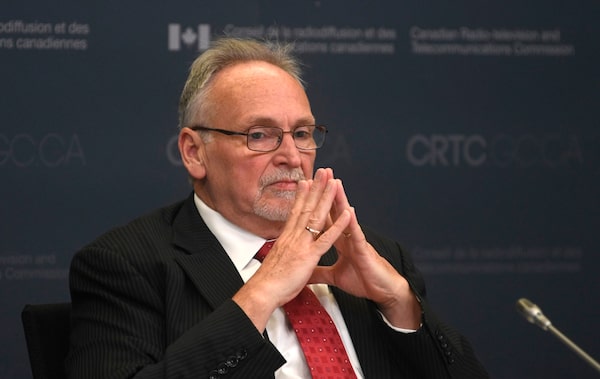
Chair Ian Scott is seen at a CRTC hearing in Gatineau, Que., Feb. 18, 2020.Adrian Wyld/The Canadian Press
Canada’s telecom regulator has rejected a request that its chair, Ian Scott, recuse himself from files related to internet competition over allegations that he is biased in favour of large telecoms.
The Canadian Radio-television and Telecommunications Commission (CRTC) rejected the request from an industry group representing independent internet service providers on the grounds that “the decision of a member of the commission to recuse themselves in respect of a matter is a decision that only the member can make.”
“Whether recusal is appropriate in a given case is a question that each member must decide each time they adjudicate a matter and the present situation is no different,” reads a letter sent Tuesday by the CRTC’s senior general counsel, Stephen Millington.
The request for Mr. Scott’s recusal, filed earlier this month by the Competitive Network Operators of Canada (CNOC), came in the wake of a controversial reversal last year by the CRTC of its own 2019 decision to lower the wholesale rates that large phone and cable companies can charge smaller internet service providers (ISPs) for access to the larger companies’ networks.
Since the reversal, critics have challenged Mr. Scott’s impartiality, pointing to a December, 2019, meeting at an Ottawa pub between Mr. Scott and Mirko Bibic, who at the time was chief operating officer of BCE Inc. and is now the company’s chief executive officer. Mr. Scott, who worked for Telus Corp. and satellite operator Telesat before being appointed CRTC chair in 2017, recently told the Toronto Star that he broke no rules during the meeting and was simply going for a beer with someone he has known “for many years.”
Geoff White, executive director and general counsel of CNOC, called the commission’s dismissal of CNOC’s request “a disappointing and disconcerting attempt to avoid accountability.” The industry group is considering its options, he added.
Mr. Scott responded to the allegations of bias during a virtual hearing last week with members of Parliament.
“We make our decisions based solely on the public record of the proceedings,” Mr. Scott said in response to a question from MP Bernard Généreux. “We put out a notice, parties file evidence, we hold hearings in certain cases and that’s what we base our decisions on – nothing else.”
The CRTC requires larger internet providers to sell network access to smaller players at regulated rates in order to encourage competition. The independent ISPs then sell internet service to their own customers.
In August, 2019, the CRTC slashed the rates that the large telecoms can charge and ordered them to make retroactive payments – at the time totalling an estimated $325-million, according to court documents – to independent ISPs. The payments were meant to compensate the small ISPs for the higher interim rates that had been in place since 2016.
The ruling prompted legal and regulatory challenges from the large phone and cable companies, who argued the new rates were so low that they would stifle investment in their networks. Both the Federal Court of Appeal and the federal cabinet declined to overturn the ruling, leaving the final decision up to the regulator itself.
The commission reversed its 2019 decision after a lengthy review, saying it found significant errors, and opted to largely maintain the interim rates that have been in place since 2016, with some adjustments. TekSavvy Solutions Inc. appealed the ruling to the Federal Court, which has agreed to hear the case.
Your time is valuable. Have the Top Business Headlines newsletter conveniently delivered to your inbox in the morning or evening. Sign up today.
 Alexandra Posadzki
Alexandra Posadzki